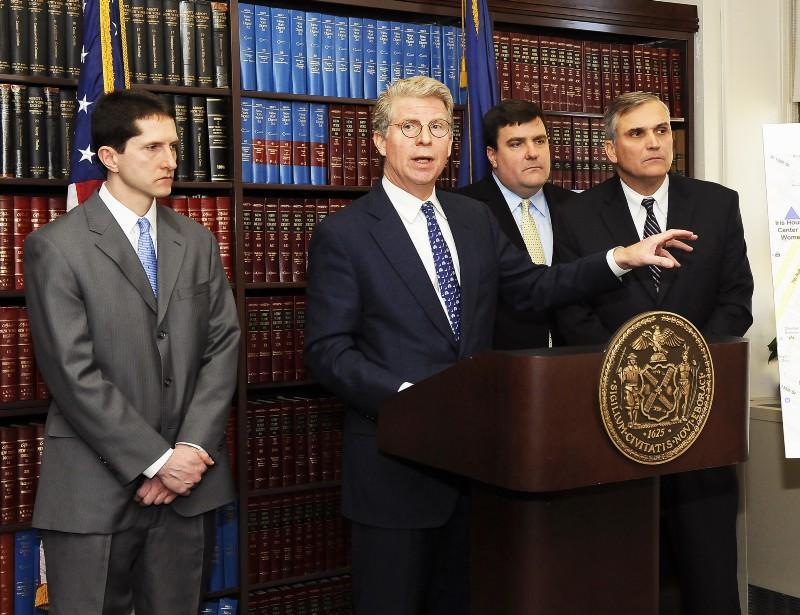Cy Vance’s Double Standard
If you’re facing criminal charges in Manhattan, it appears you might be able to get out of that jam with the right campaign donations. And if you don’t have that kind of cash? Expect to face jail time and fines, even for the lowest-level offenses. This is the transactional possibility suggested by a series of […]

If you’re facing criminal charges in Manhattan, it appears you might be able to get out of that jam with the right campaign donations. And if you don’t have that kind of cash? Expect to face jail time and fines, even for the lowest-level offenses.
This is the transactional possibility suggested by a series of high-profile prosecutions Manhattan district attorney, Cy Vance, Jr., has dropped in recent years. While powerful people in entertainment, real estate, and politics avoided prosecution, Vance’s office pursued thousands of charges for prostitution, loitering, and turnstile jumping, among other “quality of life” offenses. Not coincidentally, the people most likely to face those kinds of charges — low-income people, people of color, trans people, and immigrants, to name just some — are not likely to have well-connected attorneys and deep pockets.
This double-standard is at play in the thwarted investigation into Harvey Weinstein. The powerful Hollywood producer has now been accused of sexual harassment and sexual assault by multiple women in the entertainment industry, with more allegations still coming forward. One of those women, Ambra Battilana Gutierrez, reported Weinstein to the NYPD in March 2015, and even volunteered to help them try to catch Weinstein on the record. You can hear that tape for yourself: not only does Weinstein admit to groping Battilana, he states he was “used to that.” And he continues to attempt to intimidate her, all while being recorded with NYPD listening in.
Even with the tape, Battilana’s account, and the NYPD’s own account, District Attorney Vance declined to prosecute.
In the same year Vance dropped the Weinstein case because — as his office now claims — the NYPD didn’t have enough evidence of criminal intent, the NYPD made arrests for 326 prostitution-related offenses in Manhattan, which also ended up in Vance’s office. A few of these were for “loitering for the purposes of prostitution,” a charge usually used against women of color (cis and trans) on the street. A few more arrests were for “unauthorized practice of a profession,” typically a charge women in massage parlors face. Most charges were for prostitution.
Some of these prostitution charges are likely the result of sting operations where police pose as customers, deceiving their targets into agreeing to or actually having sexual contact with them. Some officers, like Officer Michael Golden, have repeatedly had sex with the women they arrested. This conduct is not permitted, but Vance’s office declined to prosecute Golden for multiple sexual encounters with women in prostitution investigations.
In a typical prostitution case, it is the officer’s word prosecutors rely on. They continue to use preprinted forms that prompt the arresting officer to document the attire the accused was wearing, or if the neighborhood they were in was an area known for prostitution — by which they mean, an area where police repeatedly arrest people for prostitution. For example, in Manhattan, sex is probably being sold at the Tribeca Grand Hotel, which is where the NYPD caught Weinstein on tape in his own attempt at quid pro quowith an actress. But that’s not policed the same way as Hell’s Kitchen is, the fifth most-policed neighborhood for loitering-for-prostitution of all five boroughs.
What New Yorkers charged with quality of life offenses lack is what Weinstein had when facing potentially far more serious charges: the power to get out of it. Most New Yorkers aren’t the son of former police commissioners, like Greg Kelly, who was accused of sexual assault in 2012, and who Vance chose not to prosecute. In that case, as in the allegations against Weinstein that Ambra Battilana Gutierrez brought to the NYPD in 2015, it was the woman who told police she was assaulted who ended up smeared in the press.
There’s another apparent factor in who Vance chooses to prosecute: campaign contributions. Not long after Vance dropped the Weinstein investigation, he received a $10,000 donation from Weinstein’s lawyer. Vance’s communications director says the lawyer, David Boies, wasn’t representing Weinstein in the 2015 criminal case. However, Boies was a major Vance donor. Between Boies, his son, and his partners, Vance received $182,000 in donations, according to the International Business Times.
All this has prompted reporters and political observers to ask questions about what looks like Vance’s pay-for-play, which appears even stranger given that Vance is currently running unopposed for his third term as Manhattan District Attorney. Democrat Vance has also taken donations from Marc Kasowitz, an attorney for the Trump organization. In 2012, Vance’s staff say they had a strong felony fraud case against Donald Trump, Jr. and Ivanka Trump. But after a visit from Kasowitz, Vance overruled his staff, and the investigation was dropped. Vance says he has returned these funds. But overall, Kasowitz contributed $50,000 to Vance.
On balance, these might seem like small political donations. But the women accused of selling sex in Midtown hotels and on Hell’s Kitchen streets are probably not in the habit of, nor have the ability to make, such contributions. In and out of the revolving door of prosecution they, along with thousands of other New Yorkers, remain.
